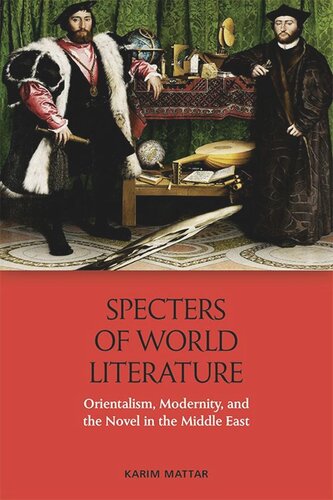

Most ebook files are in PDF format, so you can easily read them using various software such as Foxit Reader or directly on the Google Chrome browser.
Some ebook files are released by publishers in other formats such as .awz, .mobi, .epub, .fb2, etc. You may need to install specific software to read these formats on mobile/PC, such as Calibre.
Please read the tutorial at this link: https://ebookbell.com/faq
We offer FREE conversion to the popular formats you request; however, this may take some time. Therefore, right after payment, please email us, and we will try to provide the service as quickly as possible.
For some exceptional file formats or broken links (if any), please refrain from opening any disputes. Instead, email us first, and we will try to assist within a maximum of 6 hours.
EbookBell Team

4.4
92 reviewsThis book draws on Edward Said, Aamir Mufti, Jacques Derrida, and world-systems theory to address the institutionalized construct of “world literature” from its origins in Goethe and Marx to the present day. It argues that through its history, this construct has served to incorporate if not annul local literatures and the concept of “local literature” itself, and to universalize the novel, the lyric poem, and the stage play as the only literary forms appropriate to modernity. It demonstrates this thesis through a comparative reading of the reinscription of the classical Arabic-Islamic concept of “adab” as “literature” in the modern, European sense in Egypt, Turkey, and Iran in the 19th to mid-20th centuries. It then turns to the Middle Eastern novel in the global contexts of its production, translation, circulation, and reception today. Through new readings of novels and other literary works by Abdelrahman Munif, Naguib Mahfouz, Orhan Pamuk, Azar Nafisi, Yasmin Crowther, and Marjane Satrapi, and with reference to landmarks of Middle Eastern and world literary history ranging from the Mu‘allaqāt and Alf Layla wa Layla to Don Quixote, it argues that these texts—like “world literature” itself—are constitutively haunted by specters of the literary forms and traditions, of the life-worlds that they expressed, cast aside by modernity. In the case of the Middle Eastern novel, it is adab and all that it encompassed in the classical Arab-Islamic world that is suppressed or othered, but that spectral, yet returns in new, genuinely worldly constellations of form.